Abstract
The Escherichia coli lit gene product is required for the multiplication of bacteriophage T4 at temperatures below 34 degrees C. After infection of a lit mutant host, early gene product synthesis is normal, as is T4 DNA replication; however, the late gene products never appear, and early gene product synthesis eventually ceases. Consequently, at late times, there is no protein synthesis of any kind (W. Cooley, K. Sirotkin, R. Green, and L. Snyder, J. Bacteriol. 140:83-91, 1979; W. Champness and L. Snyder, J. Mol. Biol. 155:395-407, 1982), and no phage are produced. We have isolated T4 mutants which can multiply in lit mutant hosts. The responsible T4 mutations (called gol mutations) completely overcome the block to T4 gene expression (Cooley et al., J. Bacteriol. 140:83-91). We have proposed that gol mutations alter a cis-acting regulatory site on T4 DNA rather than a diffusible gene product and that the wild-type form of the gol site (gol+) somehow interferes with gene expression late in infection (Champness and Snyder, J. Mol. Biol. 155:395-409). In this communication, we report the sequence of the gol region of the T4 genome from five different gol mutants. The gol mutations are all single-base-pair transitions within 40 base pairs of DNA. Therefore, the gol site is at least 40 base pairs long. The sequence data confirm that the gol phenotype is not due to an altered protein. We also report that the gol+ site in plasmids prevents transformation of Lit- but not Lit+ E. coli. Thus, the gol site is at least partially active in the absence of the T4 genome.
Full text
PDF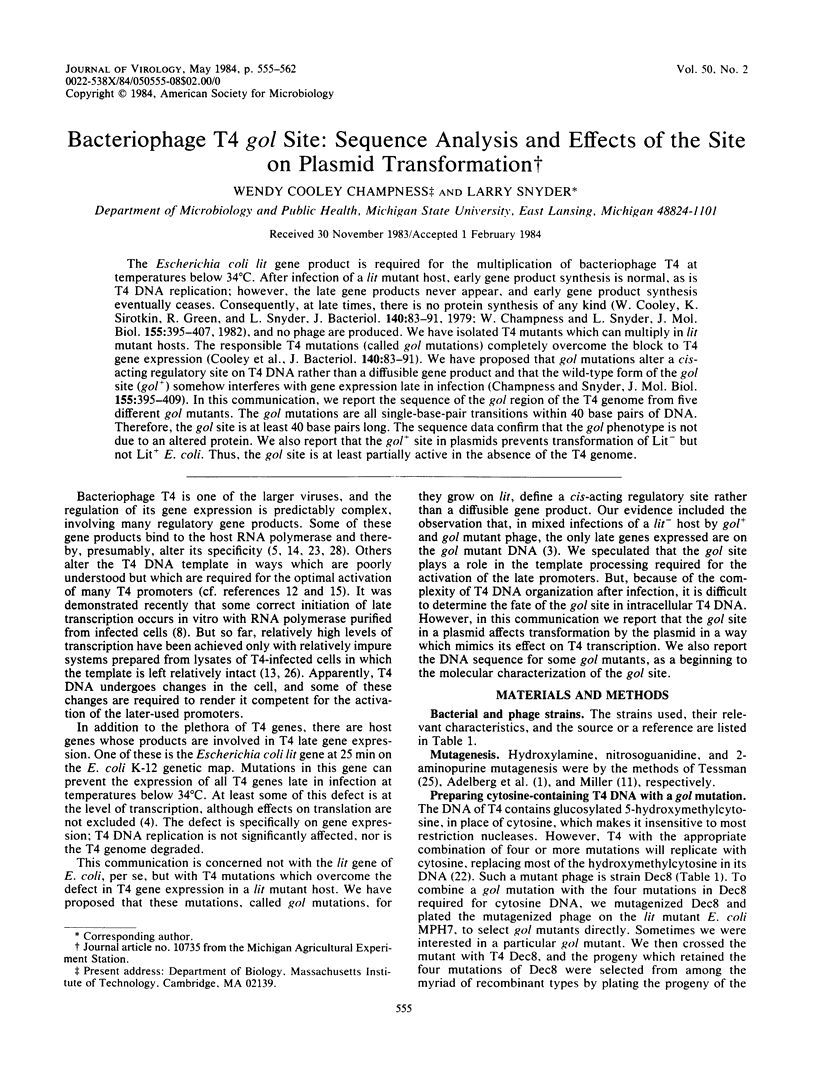
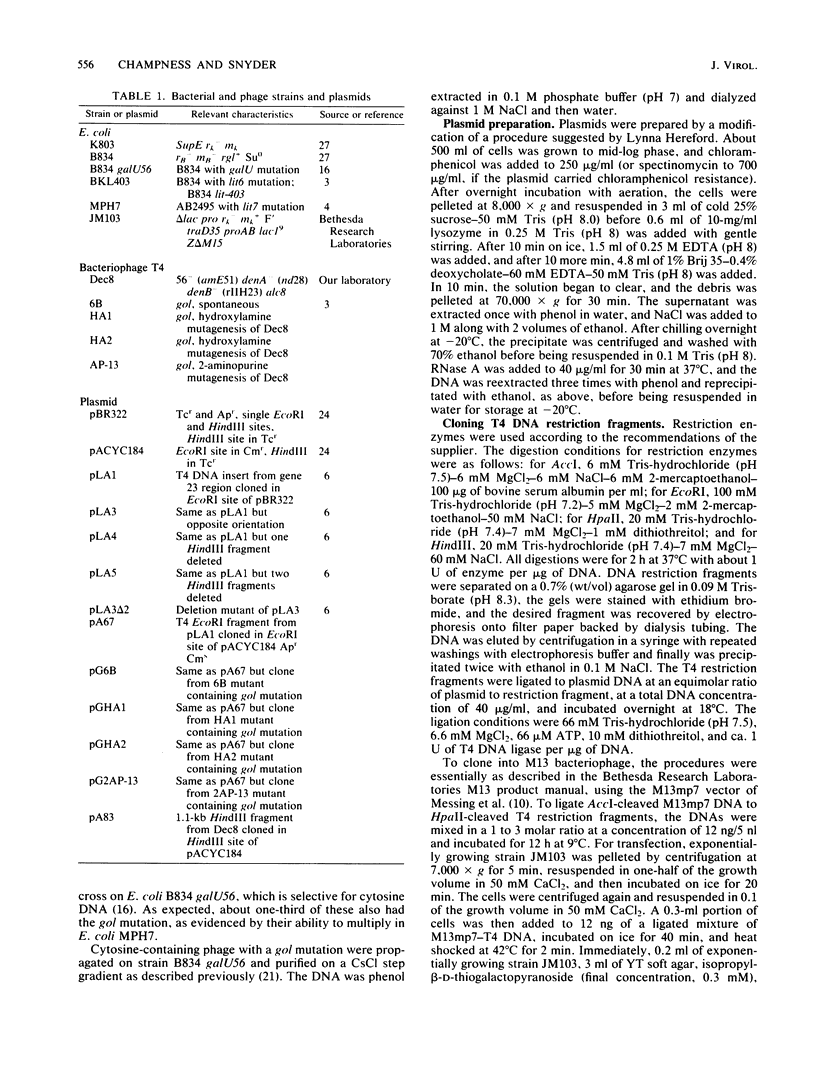
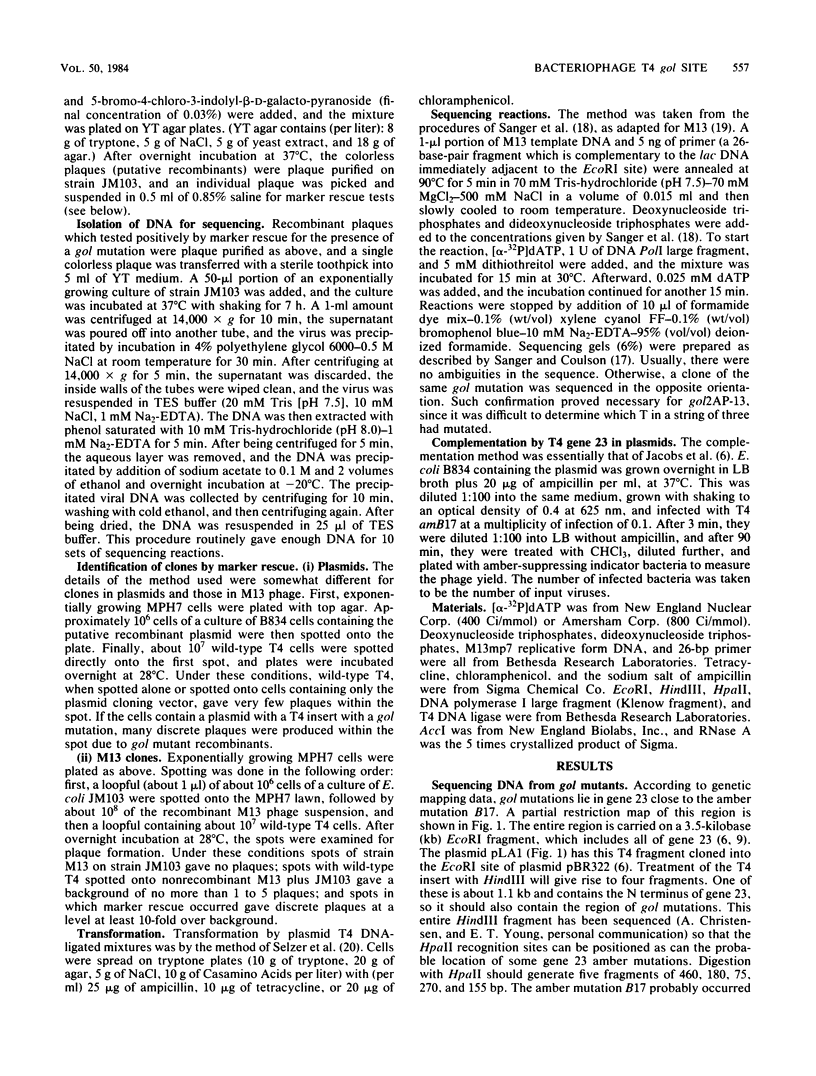
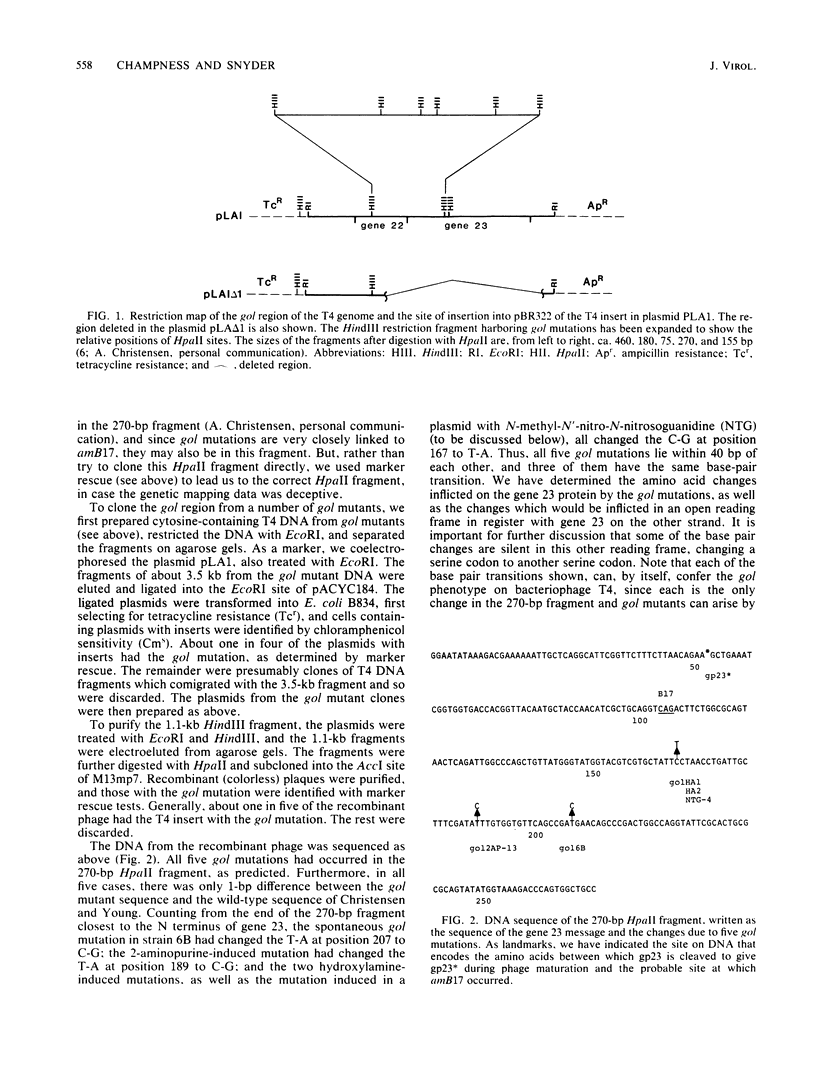
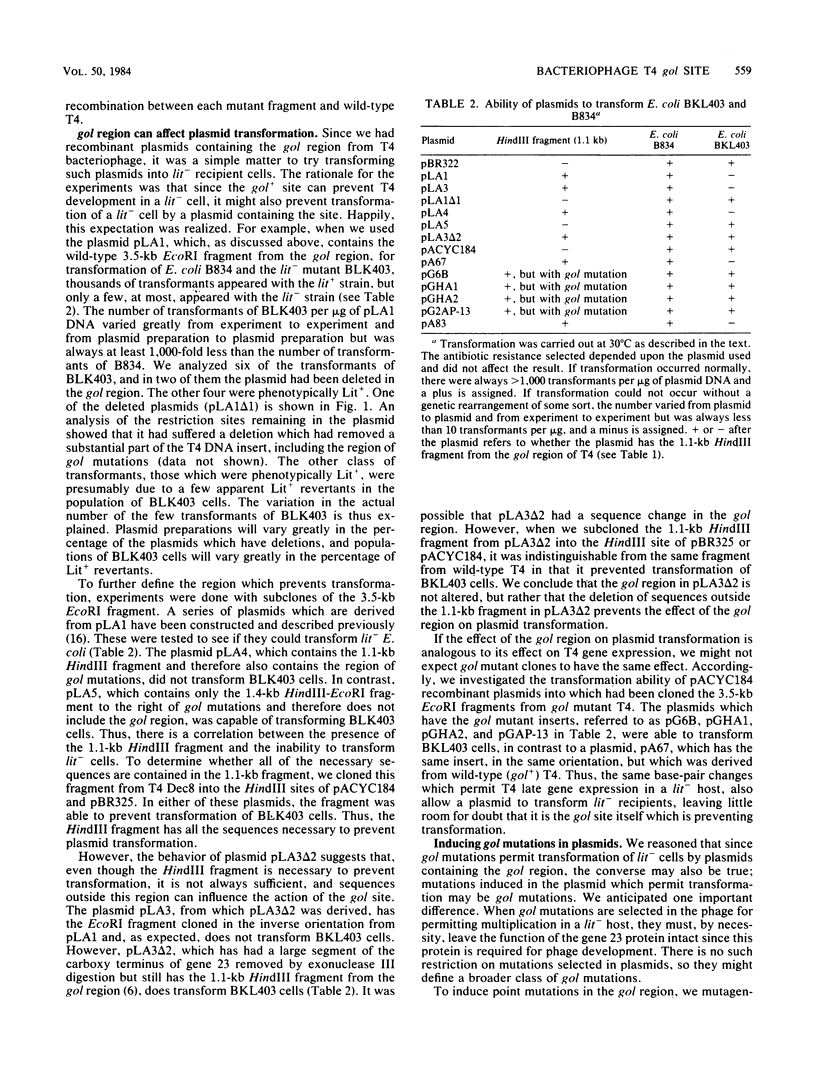
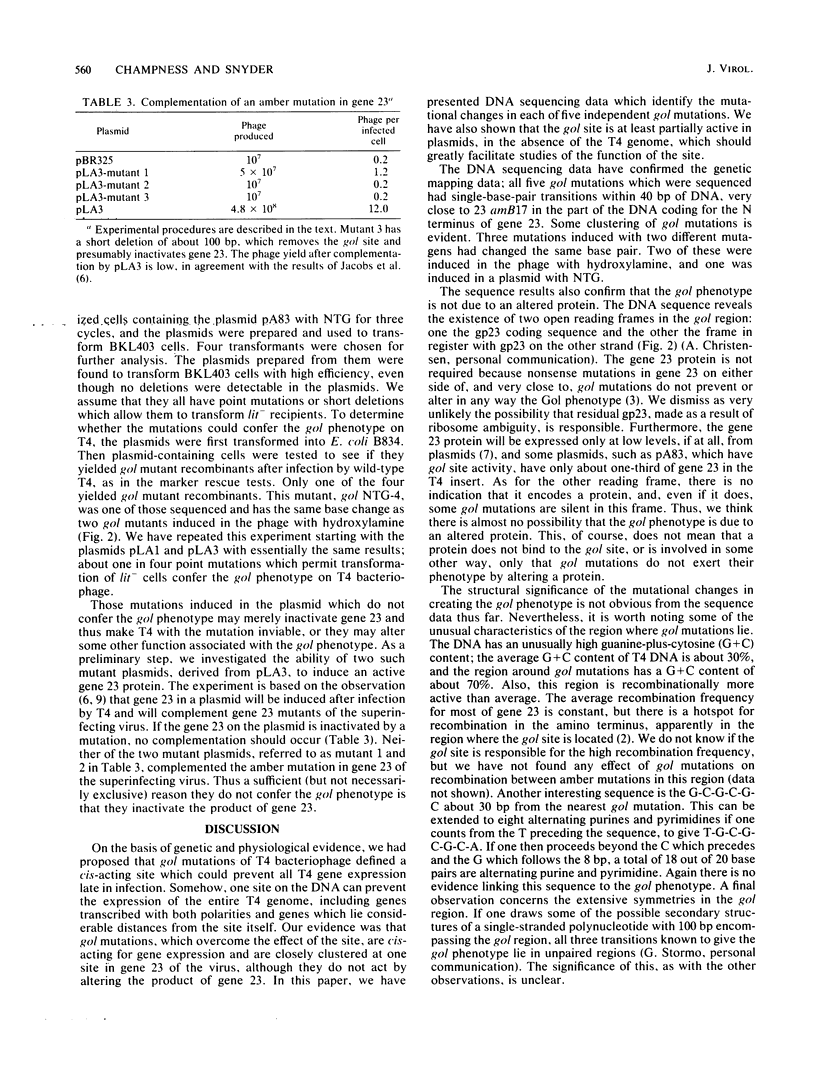
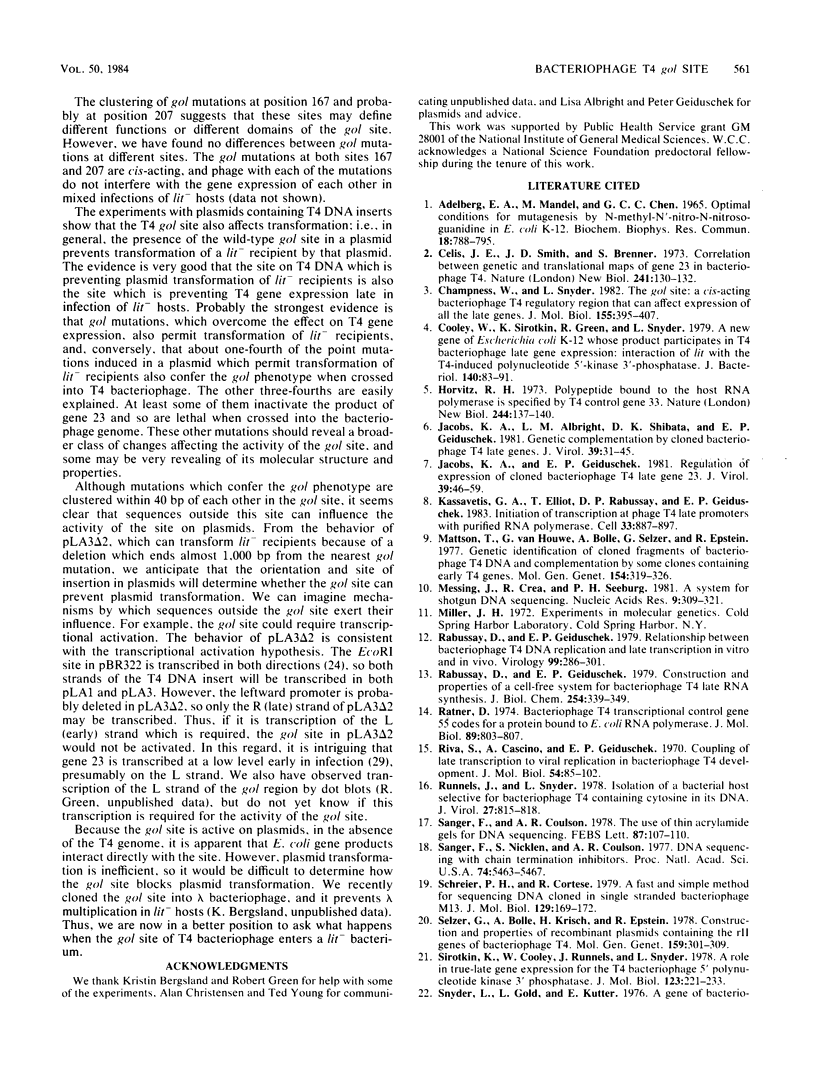
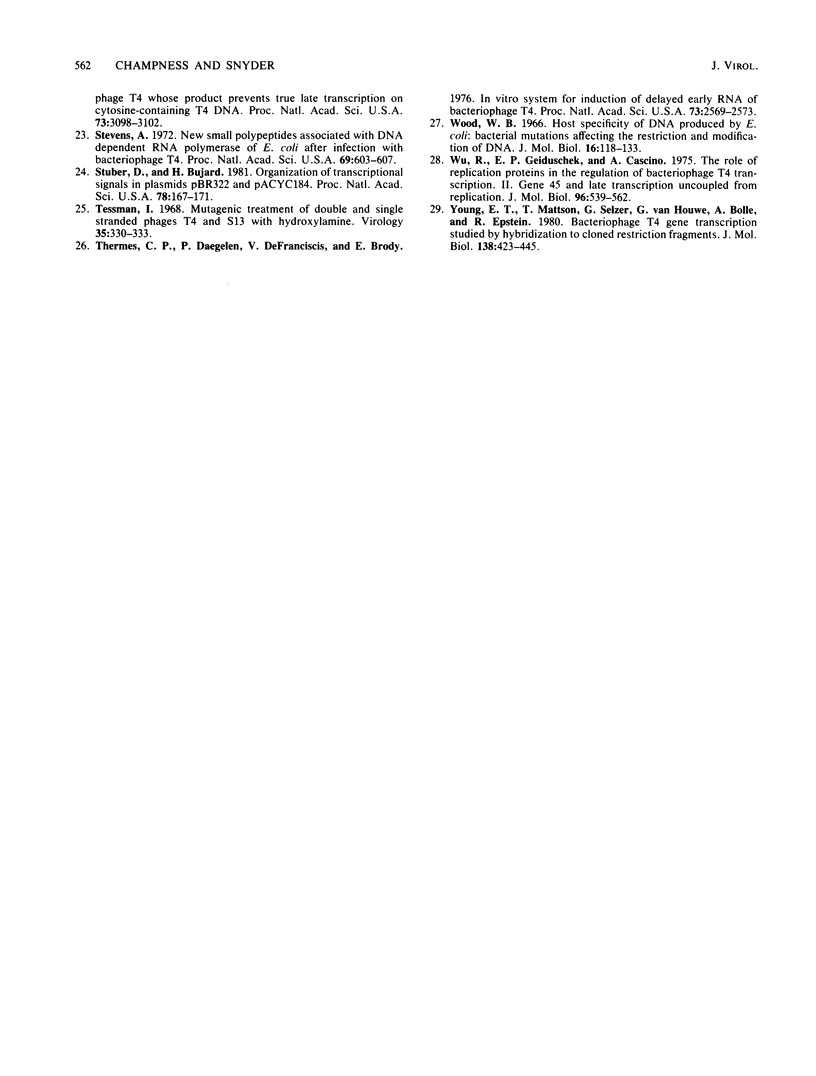
Selected References
These references are in PubMed. This may not be the complete list of references from this article.
- Celis J. E., Smith J. D., Brenner S. Correlation between genetic and translational maps of gene 23 in bacteriophage T4. Nat New Biol. 1973 Jan 31;241(109):130–132. doi: 10.1038/newbio241130a0. [DOI] [PubMed] [Google Scholar]
- Champness W. C., Snyder L. The gol site: a cis-acting bacteriophage T4 regulatory region that can affect expression of all the T4 late genes. J Mol Biol. 1982 Mar 15;155(4):395–407. doi: 10.1016/0022-2836(82)90478-8. [DOI] [PubMed] [Google Scholar]
- Cooley W., Sirotkin K., Green R., Synder L. A new gene of Escherichia coli K-12 whose product participates in T4 bacteriophage late gene expression: interaction of lit with the T4-induced polynucleotide 5'-kinase 3'-phosphatase. J Bacteriol. 1979 Oct;140(1):83–91. doi: 10.1128/jb.140.1.83-91.1979. [DOI] [PMC free article] [PubMed] [Google Scholar]
- Horvitz H. R. Polypeptide bound to the host RNA polymerase is specified by T4 control gene 33. Nat New Biol. 1973 Aug 1;244(135):137–140. doi: 10.1038/newbio244137a0. [DOI] [PubMed] [Google Scholar]
- Jacobs K. A., Albright L. M., Shibata D. K., Geiduschek E. P. Genetic complementation by cloned bacteriophage T4 late genes. J Virol. 1981 Jul;39(1):31–45. doi: 10.1128/jvi.39.1.31-45.1981. [DOI] [PMC free article] [PubMed] [Google Scholar]
- Jacobs K. A., Geiduschek E. P. Regulation of expression of cloned bacteriophage T4 late gene 23. J Virol. 1981 Jul;39(1):46–59. doi: 10.1128/jvi.39.1.46-59.1981. [DOI] [PMC free article] [PubMed] [Google Scholar]
- Kassavetis G. A., Elliott T., Rabussay D. P., Geiduschek E. P. Initiation of transcription at phage T4 late promoters with purified RNA polymerase. Cell. 1983 Jul;33(3):887–897. doi: 10.1016/0092-8674(83)90031-4. [DOI] [PubMed] [Google Scholar]
- Mattson T., Van Houwe G., Bolle A., Selzer G., Epstein R. Genetic identification of cloned fragments of bacteriophage T4 DNA and complementation by some clones containing early T4 genes. Mol Gen Genet. 1977 Sep 9;154(3):319–326. doi: 10.1007/BF00571289. [DOI] [PubMed] [Google Scholar]
- Messing J., Crea R., Seeburg P. H. A system for shotgun DNA sequencing. Nucleic Acids Res. 1981 Jan 24;9(2):309–321. doi: 10.1093/nar/9.2.309. [DOI] [PMC free article] [PubMed] [Google Scholar]
- Rabussay D., Geiduschek E. P. Construction and properties of a cell-free system for bacteriophage T4 late RNA synthesis. J Biol Chem. 1979 Jan 25;254(2):339–349. [PubMed] [Google Scholar]
- Rabussay D., Geiduschek E. P. Relation between bacteriophage T4 DNA replication and late transcription in vitro and in vivo. Virology. 1979 Dec;99(2):286–301. doi: 10.1016/0042-6822(79)90008-4. [DOI] [PubMed] [Google Scholar]
- Ratner D. Letter to the editor: Bacteriophage T4 transcriptional control gene 55 codes for a protein bound to Escherichia coli RNA polymerase. J Mol Biol. 1974 Nov 15;89(4):803–807. doi: 10.1016/0022-2836(74)90054-0. [DOI] [PubMed] [Google Scholar]
- Riva S., Cascino A., Geiduschek E. P. Coupling of late transcription to viral replication in bacteriophage T4 development. J Mol Biol. 1970 Nov 28;54(1):85–102. doi: 10.1016/0022-2836(70)90447-x. [DOI] [PubMed] [Google Scholar]
- Runnels J., Snyder L. Isolation of a bacterial host selective for bacteriophage T4 containing cytosine in its DNA. J Virol. 1978 Sep;27(3):815–818. doi: 10.1128/jvi.27.3.815-818.1978. [DOI] [PMC free article] [PubMed] [Google Scholar]
- Sanger F., Coulson A. R. The use of thin acrylamide gels for DNA sequencing. FEBS Lett. 1978 Mar 1;87(1):107–110. doi: 10.1016/0014-5793(78)80145-8. [DOI] [PubMed] [Google Scholar]
- Sanger F., Nicklen S., Coulson A. R. DNA sequencing with chain-terminating inhibitors. Proc Natl Acad Sci U S A. 1977 Dec;74(12):5463–5467. doi: 10.1073/pnas.74.12.5463. [DOI] [PMC free article] [PubMed] [Google Scholar]
- Schreier P. H., Cortese R. A fast and simple method for sequencing DNA cloned in the single-stranded bacteriophage M13. J Mol Biol. 1979 Mar 25;129(1):169–172. doi: 10.1016/0022-2836(79)90068-8. [DOI] [PubMed] [Google Scholar]
- Selzer G., Bolle A., Krisch B., Epstein R. Construction and properties of recombinant plasmids containing the rII genes of bacteriophage T4. Mol Gen Genet. 1978 Feb 27;159(3):301–309. doi: 10.1007/BF00268267. [DOI] [PubMed] [Google Scholar]
- Sirotkin K., Cooley W., Runnels J., Snyder L. R. A role in true-late gene expression for the T4 bacteriophage 5' polynucleotide kinase 3' phosphatase. J Mol Biol. 1978 Aug 5;123(2):221–233. doi: 10.1016/0022-2836(78)90322-4. [DOI] [PubMed] [Google Scholar]
- Snyder L., Gold L., Kutter E. A gene of bacteriophage T4 whose product prevents true late transcription on cytosine-containing T4 DNA. Proc Natl Acad Sci U S A. 1976 Sep;73(9):3098–3102. doi: 10.1073/pnas.73.9.3098. [DOI] [PMC free article] [PubMed] [Google Scholar]
- Stevens A. New small polypeptides associated with DNA-dependent RNA polymerase of Escherichia coli after infection with bacteriophage T4. Proc Natl Acad Sci U S A. 1972 Mar;69(3):603–607. doi: 10.1073/pnas.69.3.603. [DOI] [PMC free article] [PubMed] [Google Scholar]
- Stüber D., Bujard H. Organization of transcriptional signals in plasmids pBR322 and pACYC184. Proc Natl Acad Sci U S A. 1981 Jan;78(1):167–171. doi: 10.1073/pnas.78.1.167. [DOI] [PMC free article] [PubMed] [Google Scholar]
- Tessman I. Mutagenic treatment of double- and single-stranded DNA phages T4 ans S13 with hydroxylamine. Virology. 1968 Jun;35(2):330–333. doi: 10.1016/0042-6822(68)90275-4. [DOI] [PubMed] [Google Scholar]
- Thermes C., Daegelen P., De Franciscis V., Brody E. In vitro system for induction of delayed early RNA of bacteriophage T4. Proc Natl Acad Sci U S A. 1976 Aug;73(8):2569–2573. doi: 10.1073/pnas.73.8.2569. [DOI] [PMC free article] [PubMed] [Google Scholar]
- Wood W. B. Host specificity of DNA produced by Escherichia coli: bacterial mutations affecting the restriction and modification of DNA. J Mol Biol. 1966 Mar;16(1):118–133. doi: 10.1016/s0022-2836(66)80267-x. [DOI] [PubMed] [Google Scholar]
- Wu R., Geiduschek E. P. The role of replication proteins in the regulation of bacteriophage T4 transcription. II. Gene 45 and late transcription uncoupled from replication. J Mol Biol. 1975 Aug 25;96(4):539–562. doi: 10.1016/0022-2836(75)90138-2. [DOI] [PubMed] [Google Scholar]
- Young E. T., Mattson T., Selzer G., Van Houwe G., Bolle A., Epstein R. Bacteriophage T4 gene transcription studied by hybridization to cloned restriction fragments. J Mol Biol. 1980 Apr 15;138(3):423–445. doi: 10.1016/s0022-2836(80)80011-8. [DOI] [PubMed] [Google Scholar]


